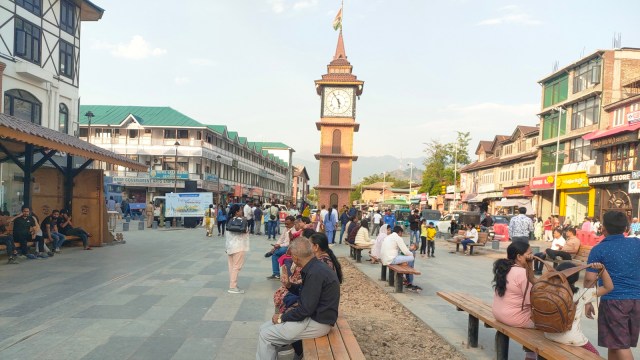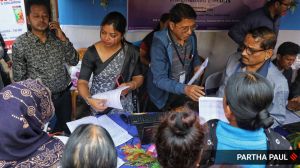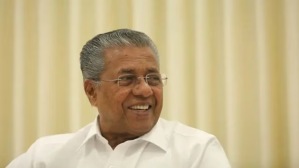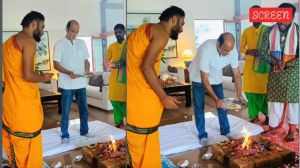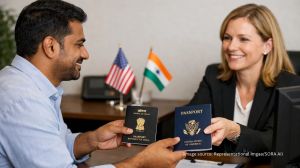In each of these cases, officers in the J&K Police and the administration say there are either FIRs, or “evidence” that the person “indulged” in protests or stone pelting in the distant past, or just because a relative was a militant decades ago. In fact, official orders have been issued banning even the criticism of the government and its policies or schemes by government employees and “their family members”. These hard actions, with a punitive aspect, are also, as NC Vice President Omar Abdullah says, a reason behind the “silence” in the Valley.

Over the last three years, the J&K administration has dismissed 74 government employees “in the interest of the security of the state” without conducting an inquiry, giving them a chance to explain their position or even informing them why. The government has taken the route of Article 311(2)(C) that empowers it to dismiss a government employee without giving an opportunity to the individual to present a defence.
Of the 74 terminated employees, 67 belong to the Kashmir Valley and seven to Jammu region. Three of them are women — two teachers and a civil servant. The civil servant was married to a former JKLF militant.
When asked about the legality of such orders, Lieutenant Governor Manoj Sinha told The Indian Express, “There is not a single case, where there is no FIR, where there is no history or solid evidence… There has been a debate when Article 311 was being drafted in Constitution. Sardar Patel has himself said if there is a threat to the state, and there is irrefutable evidence, there is no need to give an opportunity to the person. He/ she should be removed.”
Manzoor Ahmad Laway, a government teacher from south Kashmir’s Kulgam district, was one such employee. In May 2021, the L-G was all praise for him for his work as a Covid warrior in ‘Awaam ki Awaaz’, a radio interaction on the lines of Prime Minister’s ‘Mann ki Baat’. Three years later, he was terminated allegedly for “being a threat to the security of the state”. The government cited an FIR against him for alleged stone pelting during a protest in 2016 as the reason.
Laway is among the 74 government employees terminated under the Article 311(2)(C) along with a senior Kashmir University professor, a computer scientist, a woman civil servant, principal of a higher secondary school, assistant professors and police personnel.
Story continues below this ad
In many cases, after the services of the employees are terminated, their travel documents are impounded or they are put on the Look Out Circular (LoC) to prevent them for taking up a job outside the country. These employees lose their post retirement benefits, including gratuity and pension. Asked about this, J&K Director General of Police R R Swain said, “There are 3.6 lakh regular employees and about 1.25 lakh semi-regular employees. Just over 70 people have been removed from service under national security clause. That’s 0.014 %. And who are the people being removed? Sons of (United Jihad Council chief) Syed Salahuddin.”
The government has also denied police verification to many, which is required before they can take up a job, get government contracts and travel documents, “for past links to militancy or the separatism or of their relatives”. While there is no circular or order on these, the administration had revoked 98 passports — of journalists, academics, civil society activists and students — last year under section 10(3)(C) of the Passport Act citing “threat to the security of the state”.
L-G Sinha said aggrieved persons can approach the administration. “If anyone feels it, he can represent it and we will evaluate it. We are open. In two cases, I myself ensured verification was given after representations were found to be genuine. But if someone says I will change my behaviour now, but has a dubious past, then how can we give them the service verification,” he said.
DGP Swain said over 24,000 people were selected for recruitment and only six persons have been denied placement. “One cannot find fault if the State takes steps to quarantine itself from insider threat after a person is assessed to be vulnerable to duress or inducement of a national security adversary,” he said.
Story continues below this ad
Over the last four years, the J&K Police CID has also put scores of people on a ‘Look out circular’ barring them to move out of the country — these include journalists, academics, activists and students, most of them studying MBBS in Pakistan.
“I was studying in the second year of MBBS in Pakistan. I came home during vacation. But when I went back, I was stopped at Wagah. I was informed that I can’t go back because J-K Police have put me on Look out notice,” said a 21-year-old student from north Kashmir, who did not wish to be named. “When I checked around, I found many of my classmates had also been stopped. Sometime later, I got a letter that my passport too has been revoked. We have lost our three precious years. We can’t get admission here because all our documents are in our colleges there (Pakistan). Our careers are at stake.”
Over the last month or so, police have arrested four lawyers, including two former presidents of the High Court Bar Association, Mian Abdul Qayoom and Nazir Ahmad Ronga. While Qayoom was arrested in a case related to the murder of lawyer Babar Qadri in 2020, the other three lawyers have been booked under the Public Safety Act (PSA) that allows the government to detain a person without trial for three years.
“The government has dismantled every institution that spoke for the people,” said a Srinagar-based lawyer, who works at the High Court. “First, they locked down the press club leaving journalists without a body and then they have stopped lawyers from Bar elections. The government on the other hand has facilitated parallel institutions,” he said.
Story continues below this ad
The local media also faces restrictions. “We are government mouthpieces,” said the editor of a local daily. “We have been forced into submission. We get directions on what to publish and what not to, even the language that we must use,” he said.
Asked about this, L-G Sinha said, “I want to clearly state that I welcome constructive criticism. But we have to keep note of a fine line in Jammu & Kashmir. The country’s security should not be put in jeopardy. Those who are mindful of this red line, they can criticise anything.”
The government is also registering more and more cases under the UAPA. With the PSA, which was described as a ‘lawless law’ by Amnesty International, drawing international attention, police have shifted to the more stringent Unlawful Activities Prevention Act (UAPA). While the courts would often quash the PSA, bail under the UAPA is difficult. The police have also started acting against the investigation officers (IOs), where the accused booked under UAPA gets acquitted or bailed out.
In the Valley, the accused have been booked under anti-terror laws for smaller offences like stone pelting, sloganeering or celebrations over Pakistan’s win in cricket. Official figures reveal that for the three years from 2020 to 2022, over one-third of the UAPA cases are reported from J&K.
Story continues below this ad
The figures show during this period, one UAPA case was registered per 14,000 people while it is one case per 8,00,000 people in the rest of the country. For a population of less than one percent, 36 per cent of total UAPA cases have been registered in three years, reveals the NCRB data.
(With P Vaidyanathan Iyer in Srinagar)

